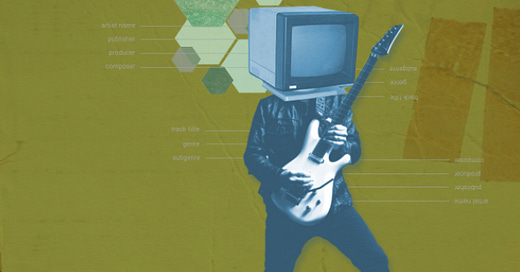Hi folks
Happy Saturday! Welcome to The Industry Playlist
This week I tackle something that is being key to protecting creative work. Ownership technologies need to make a comeback. Independent artists must get behind this if they want their interests protected.
Finally, in a world where its increasingly getting difficult to discern between an AI track and human track, particularly when it comes to electronic sounds, there’s YokoO producing electronic music (almost meditative minimal tech house) for the soul. It’s a >7 min track that he first put out on SoundCloud back in 2013. Check out Amazonia 🎵
Now, let’s get to it.
🪁 SONIC SHIFTS
Ownership technologies & Why Metadata is the First Line of Defense
AI is everywhere in music right now, and it’s raising a lot of uncomfortable questions. Tools like Suno and Udio are helping anyone make tracks in seconds, and streaming farms are already gaming the system with machine-made filler. The more this accelerates, the harder it becomes for human-led creativity to stand out. And that’s not just a vibe shift—it’s an economic one.
This isn’t the first time music has faced disruption. But if the industry wants to stay artist-first, it needs to meet the moment with the right tools. That means a renewed focus on ownership technologies. Everything from attribution tech, blockchain and smart contracts are on the table, but the foundation starts with something less flashy: metadata. Who made the track? Who owns the rights? Who should get paid? Clean, accurate metadata is what makes all of that possible. Without it, artists are basically invisible in the systems that are supposed to support them.
Metadata might seem like a technical detail, but it’s becoming the key to protecting creative work. The more AI gets integrated into music, the more important it’ll be to verify authorship, track royalties, and manage collaboration in a way that respects artistic intent. And this isn’t just on labels or platforms. Artists and managers—especially those working independently—need to treat metadata like infrastructure.
It’s also about value. Catalogs with complete and verified data are already proving more valuable in licensing and sync markets. And that value will only grow as DSPs, search engines, and recommendation systems rely more on structured data to surface and rank content. The better your data, the more discoverable (and defensible) your work becomes.
For independent artists, the takeaway is simple. Know your data. Own your metadata. In a world where AI output can flood the system overnight, the ability to prove your creative footprint—and get paid for it—isn’t a nice-to-have. It’s the baseline.
📚 CURATED INSIGHTS
The 1% Reality: What the numbers tell us about DJ Economics. I’m glad someone has dived into this world and brought out a tough reality. Rufy is also a fantastic DJ whom I’ve caught a few times in Goa.
Is streaming music's final form? And if not, what's next? Streaming is losing cultural ground. Because streaming and algos have flattened culture, we have come to accept that today’s “culture” is the only type that could ever exist. But there’s more out there, I expect that more and more artists will build their business outside of the current music rights monetization framework and seek out non-traditional partners.
The slow streaming movement: counteracting Spotify & co's economic impact on artists. This is linked to the anti-algorithm movement I’ve talked about before. So how does one become a better streaming music consumer? Read this article to know more.
How Are VCs Thinking About Music In 2025? Music tech as a VC investible category is still nascent; that’s because music - and more broadly, content - doesn’t scale the same way as technology. Funds are mostly focused on technology that impacts the lives and businesses of creative people.
Audiences prove that experts are dead wrong. TL;DR long form isn’t dead. Yay. The author writes that many of the dominant digital trends are causing great harm. But they are unsustainable, and therefore they will reverse. Yay again.
Belonging vs Algorithm. Music used to give a sense of identity to people but not so much these days. As AI continues to emulate realism, maybe we will be forced out into the world to find what’s really there.
How AI and social have changed the value of creators. Cutting costs has meant cutting out creators.
🔥 KEEP TRACK OF
James Blake to launch a platform focused on music-industry transparency. This guy has been holding the fort of what is the most pressing concerns for artists. Industry transparency. Last year he launched a direct-to-fan music platform (Vault.fm) in response to abysmal streaming payments. It’s a long fight which I am following closely.
AI Music Labels are here. Vocs AI launched an AI music label with a roster that features over 40 licensed AI artists. After Timbaland joined hands with Suno to legitimize AI music, he’s also out to rub his spoils to independent artists by creating an entire new AI genre called ‘A-Pop’. Except he’s been complicit in stealing works of independent producers to train AI. Hope AI comes back to bite his a**.
Spotify’s Video Ambitions. Spotify will do everything but focus on building music culture. Now its luring YT creators with lucrative deals. I’ve written about in the past how Spotify will mimic a TikTok or YouTube as it looks for growth. DistroKid now lets you upload unlimited full length music videos to Spotify.
❄️ INTERESTING STUFF
[PDF] Gen Z on GenAI. Interesting survey report by Stanford Entertainment Lab on GenZs relationship with GenAI. One finding stood out for me - music is the media type that Gen Z most passionately cares about being human made.
That’s all for today. We’ll be back in your inbox next week.
Thanks for reading,
Rohit



